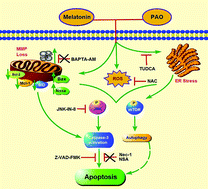当前位置:
X-MOL 学术
›
Metallomics
›
论文详情
Our official English website, www.x-mol.net, welcomes your feedback! (Note: you will need to create a separate account there.)
Melatonin triggers the anticancer potential of phenylarsine oxide via induction of apoptosis through ROS generation and JNK activation.
Metallomics ( IF 3.4 ) Pub Date : 2020-01-21 , DOI: 10.1039/c9mt00238c Shahbaz Ahmad Zakki 1 , Jibran Sualeh Muhammad , Jin-Long Li , Lu Sun , Meng-Ling Li , Qian-Wen Feng , Yu-Lin Li , Zheng-Guo Cui , Hidekuni Inadera
Metallomics ( IF 3.4 ) Pub Date : 2020-01-21 , DOI: 10.1039/c9mt00238c Shahbaz Ahmad Zakki 1 , Jibran Sualeh Muhammad , Jin-Long Li , Lu Sun , Meng-Ling Li , Qian-Wen Feng , Yu-Lin Li , Zheng-Guo Cui , Hidekuni Inadera
Affiliation

|
Melatonin, a safe endogenous hormone and a natural supplement, has recently been recognized to have antiproliferative effects and the ability to sensitize cells to other anticancer therapies. Phenylarsine oxide (PAO) has anticancer potential but it is considered as a toxic agent. In this study we combined melatonin to reduce the toxicity while securing the anti-cancer effects of PAO. Cell viability was determined by MTT assay, whereas cytotoxic assays were performed using an LDH cytotoxicity assay kit. Cell cycle analysis, Annexin V/PI staining, the mitochondrial membrane potential (MMP), mitochondrial calcium and reactive oxygen species (ROS) generation were analyzed using flow cytometry. Sytox stained cells were visualized by fluorescence microscopy and the expression of proteins was detected by western blotting. Melatonin increased the anticancer potential of PAO by decreasing the cell viability and increasing LDH release in various cancer cells. The mode of cell death was determined to be typical apoptosis, as evidenced by Annexin V/PI-stained cells, PARP cleavage, and caspase-3 activation, and with significant modulations in the expression of proapoptotic, antiapoptotic and cell cycle-related proteins. ROS generation played a critical role in induction of cell death by this combined treatment, which is validated by reversal of cytotoxicity upon cotreatment with NAC. Furthermore, the activation of MAPKs, especially JNK, contributed to the induction of cell death, accompanied by endoplasmic reticulum stress and autophagy, affirmed by the abrogation of cytotoxicity after JNK-IN-8 and TUDCA application. Melatonin showed promising potential as a chemotherapeutic agent in combination with PAO to achieve a better anticancer response.
中文翻译:

褪黑素通过通过ROS产生和JNK激活诱导细胞凋亡来触发苯砷酰氧化物的抗癌潜力。
褪黑激素是一种安全的内源激素和天然补品,最近被认为具有抗增殖作用以及使细胞对其他抗癌疗法敏感的能力。苯氧化砷(PAO)具有抗癌潜力,但被视为有毒物质。在这项研究中,我们结合褪黑激素来降低毒性,同时确保PAO的抗癌作用。通过MTT测定法确定细胞活力,而使用LDH细胞毒性测定试剂盒进行细胞毒性测定。使用流式细胞仪分析细胞周期分析,膜联蛋白V / PI染色,线粒体膜电位(MMP),线粒体钙和活性氧(ROS)生成。通过荧光显微镜观察Sytox染色的细胞,并通过蛋白质印迹法检测蛋白质的表达。褪黑素通过降低各种癌细胞中的细胞活力和增加LDH释放来增加PAO的抗癌潜力。细胞死亡的模式被确定为典型的凋亡,如膜联蛋白V / PI染色的细胞,PARP裂解和caspase-3活化所证明的,并且具有促凋亡,抗凋亡和细胞周期相关蛋白表达的显着调节。通过这种联合治疗,ROS的产生在诱导细胞死亡中起着关键作用,这在与NAC共同治疗后细胞毒性的逆转得到了验证。此外,MAPKs,特别是JNK的激活,有助于诱导细胞死亡,并伴随着内质网应激和自噬,这由JNK-IN-8和TUDCA应用后细胞毒性的消除所证实。
更新日期:2020-03-26
中文翻译:

褪黑素通过通过ROS产生和JNK激活诱导细胞凋亡来触发苯砷酰氧化物的抗癌潜力。
褪黑激素是一种安全的内源激素和天然补品,最近被认为具有抗增殖作用以及使细胞对其他抗癌疗法敏感的能力。苯氧化砷(PAO)具有抗癌潜力,但被视为有毒物质。在这项研究中,我们结合褪黑激素来降低毒性,同时确保PAO的抗癌作用。通过MTT测定法确定细胞活力,而使用LDH细胞毒性测定试剂盒进行细胞毒性测定。使用流式细胞仪分析细胞周期分析,膜联蛋白V / PI染色,线粒体膜电位(MMP),线粒体钙和活性氧(ROS)生成。通过荧光显微镜观察Sytox染色的细胞,并通过蛋白质印迹法检测蛋白质的表达。褪黑素通过降低各种癌细胞中的细胞活力和增加LDH释放来增加PAO的抗癌潜力。细胞死亡的模式被确定为典型的凋亡,如膜联蛋白V / PI染色的细胞,PARP裂解和caspase-3活化所证明的,并且具有促凋亡,抗凋亡和细胞周期相关蛋白表达的显着调节。通过这种联合治疗,ROS的产生在诱导细胞死亡中起着关键作用,这在与NAC共同治疗后细胞毒性的逆转得到了验证。此外,MAPKs,特别是JNK的激活,有助于诱导细胞死亡,并伴随着内质网应激和自噬,这由JNK-IN-8和TUDCA应用后细胞毒性的消除所证实。


























 京公网安备 11010802027423号
京公网安备 11010802027423号